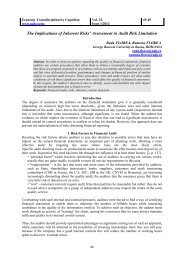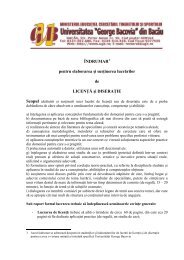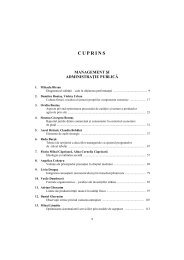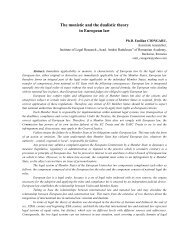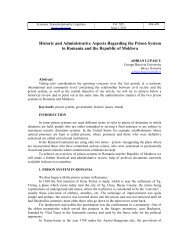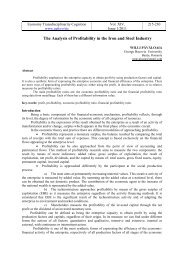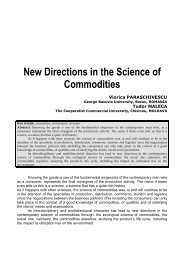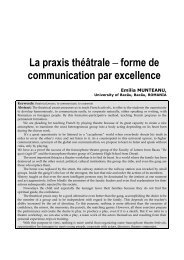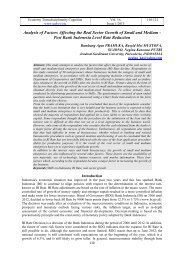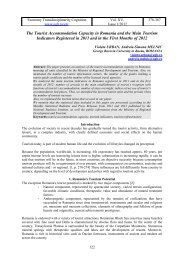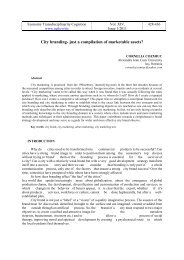BULETIN ÄTIIN IFIC - Universitatea George Bacovia
BULETIN ÄTIIN IFIC - Universitatea George Bacovia
BULETIN ÄTIIN IFIC - Universitatea George Bacovia
Create successful ePaper yourself
Turn your PDF publications into a flip-book with our unique Google optimized e-Paper software.
Advantages and disadvantages of face-to-face business communication 65<br />
3.2. The tactics used in the distributive negotiation are called by Ch. Dupont<br />
“pressure, coercive, destabilizing, conflict tactics” 5<br />
3.2.1. Threat with the following variations<br />
a) The warning<br />
e.g. “Your attitude will have serious consequences.”<br />
b) De-counselling<br />
e.g. “We do not advise you to make this decision because it will not be in your advantage.”<br />
c) The direct threat<br />
e.g. “We shall act in such a way that your reputation be ruined.”<br />
d) The injunction/opposition<br />
e.g. “You shall act as we say, otherwise you may regret.”<br />
e) Showing the accomplished fact<br />
e.g. “We have already announced our clients that the delivery date is 2 nd of March”<br />
f) The negative appeal to norms<br />
e.g. “What you ask is against our usage.”<br />
g) “Everything or nothing”<br />
e.g. “In this case our price is not negotiable.”<br />
h) The use of surprise (by introducing new facts)<br />
e.g. “You know that now the ROL – dollar rate is …”<br />
i) The change of the decisional plan<br />
e.g. “We gave to inform you that we gave up the items concerning the delivery.”<br />
j) The sudden change of position<br />
e.g. “In this case we shall give up to grant you a price reduction.”<br />
k) Asymmetrical concessions<br />
e.g. “We could grant you a discount, if you placed a larger order.”<br />
l) The avoidance<br />
e.g. “We regret, but we cannot decide on this particular matter.”<br />
<br />
<br />
<br />
3.2.2. Time-based tactics<br />
a) The temporising<br />
b) “Speeding up”<br />
c) Finding a good reason for interrupting the negotiation<br />
e.g. “As a am to go abroad, we shall discuss the details on my coming back.”<br />
d) The pretext<br />
e.g. “We have to wait for our general manager’s coming from abroud, as I cannot take this<br />
decision on my own.”<br />
e) The withdrawal<br />
e.g. “We are not able to participate in the negotiations tomorrow, as a special situation<br />
occurred.”<br />
f) The diversion<br />
e.g. “If you don’t mind, I’d like to come back to the clause referring to the terms of delivery<br />
we discussed yesterday.”<br />
5 Dupont, Ch. (1990): La négotiation, conduite, théorie, applications, Dallez, pp. 83-84.



